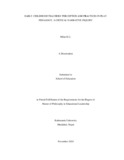
Please use this identifier to cite or link to this item:
https://hdl.handle.net/20.500.14301/492| Title: | Early Childhood Teachers’ Perception and Practices on Play Pedagogy: A Critical Narrative Inquiry |
| Authors: | K.C., Milan |
| Citation: | K.C,M.(2024).Early childhood teachers’ perception and practices on play pedagogy: A critical narrative inquiry. |
| Issue Date: | Nov-2024 |
| Publisher: | Kathmandu University School of Education |
| School: | SOED |
| Department: | DOEL |
| Level: | M.Phil. |
| Program: | MPhil in Educational Leadership |
| Abstract: | Play is the central focus of the early childhood curriculum as a natural and purposeful behavior. Research shows that play drives the development of young children’s learning and development. Children’s play is considered critical in the holistic development and learning of young children. The philosophical foundation of the study includes research by Piaget and Lev Vygotsky, who believed that children learn best when they engage actively with hands-on learning rather than when they are instructed. Specifically, play has been keenly shown to foster learning and development in all the domains of early childhood development. Play pedagogy is acknowledged as the most effective way to teach young children as it is linked to developmentally appropriate practice. Developmentally appropriate practice is when teaching strategies respond to and match the child’s age and developmental needs. However, early childhood educators in Nepal follow content-centered learning rather than developmentally appropriate practice that is responsive to their individual growth and needs. Play pedagogy is new in Nepal and as a consequence, our teachers lack sufficient training opportunities related to play theory and practice. The purpose of this qualitative study was to explore early childhood development teachers’ perceptions and strategies with regard to play. Child development and constructive grounded theories were reviewed and examined to build the constructs of this specific study. The study took place in Gandaki Province among six early childhood teachers from four community-based schools. In this critical narrative study, I strived to understand their perspectives and their classroom decisions with respect to play in the context of Nepal through formal interviews and observations. The methodology utilized in the study involved data collection that consisted of in-depth interviews, field notes, observation of the teachers and continuous critical reflectivity. The data in this study was carefully organized based on each key question and qualitative responses were carefully analyzed. A consistent finding of this study revealed that teachers understood play and learning as two different concepts and activities. Therefore, they could not integrate play and learning in their responses throughout the interview. Also, the findings indicated that even though play activities were suggested in the early childhood curriculum of Nepal, teachers were not integrating them due to a lack of observation, support, and planning developmental activities. The findings on this lack of understanding were consistent across the entire sample and also reflected other key issues of organization and safety. This study confirms the need for a better understanding of play pedagogy and its value to children’s learning and development. Also, results confirmed that teachers critically need sufficient knowledge about child development and the importance of play in early child development education. Critical analysis of this study solidified the challenges that new teachers face as well when they lack training or education in play pedagogy. As I conclude this study, I recommend further research to ensure and support educators in child development and play pedagogy in Nepal since these are the early years and foundation for later growth and success. |
| URI: | https://hdl.handle.net/20.500.14301/492 |
| Appears in Collections: | Dissertation |
Files in This Item:
| File | Description | Size | Format | |
|---|---|---|---|---|
| Milan KC Thesis November Final (1) (2) (1) (1).pdf | 1.9 MB | Adobe PDF |  View/Open |
Items in DSpace are protected by copyright, with all rights reserved, unless otherwise indicated.